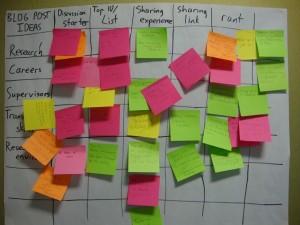Whatever job you have, there are lots of things that you will recognise as being “the worst part of the job”. There’s never just one thing, there’s only whatever the thing is when you think of it. In what I think of as my day job, facilitating and delivering workshops to researchers, things that I have thought of as the worst part of the job have included:
- interrupting people to move on to the next discussion/activity in a workshop;
- travelling long distances;
- being away from my daughter;
- doubt about whether or not you’re connecting with a quiet room.
Today I have a new one: not taking my own advice.

